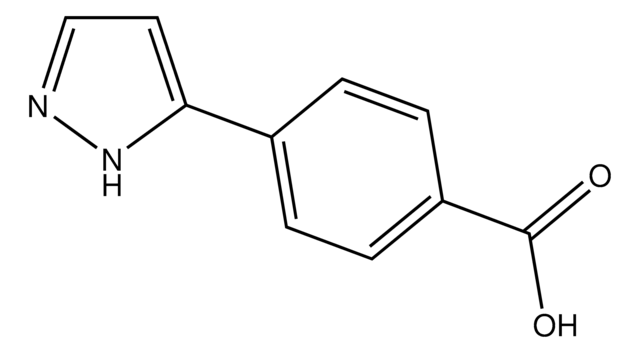763535
5-(3-Pyridyl)-1H-tetrazole
97%
Synonym(s):
3-(1H-Tetrazol-5-yl)pyridine, 5-β-Pyridyltetrazole
Sign Into View Organizational & Contract Pricing
All Photos(1)
About This Item
Empirical Formula (Hill Notation):
C6H5N5
CAS Number:
Molecular Weight:
147.14
MDL number:
UNSPSC Code:
12352100
PubChem Substance ID:
Recommended Products
assay
97%
form
solid
mp
238-242 (Decomposition)
SMILES string
c1cncc(c1)-c2nnn[nH]2
InChI
1S/C6H5N5/c1-2-5(4-7-3-1)6-8-10-11-9-6/h1-4H,(H,8,9,10,11)
InChI key
SECHDFHDDVELCV-UHFFFAOYSA-N
signalword
Danger
hcodes
Hazard Classifications
Eye Dam. 1
Storage Class
13 - Non Combustible Solids
wgk_germany
WGK 3
Choose from one of the most recent versions:
Certificates of Analysis (COA)
Lot/Batch Number
Don't see the Right Version?
If you require a particular version, you can look up a specific certificate by the Lot or Batch number.
Already Own This Product?
Find documentation for the products that you have recently purchased in the Document Library.
Tian Wen et al.
Inorganic chemistry, 52(1), 12-14 (2012-12-19)
Two isomeric two-dimensional copper(I) coordination polymer materials based on an in situ generated 5-(3-pyridyl)tetrazole ligand show similar layer structures but distinct photoluminescent and photocatalytic properties, which present an interesting comparative study on the structure-property correlation between isomeric materials.
G D Stratton et al.
Biochemical pharmacology, 34(2), 275-279 (1985-01-15)
Using an isolated rat epididymal adipocyte system we have studied the development of tolerance to and cross-tolerance between nicotinic acid, 5-methylpyrazole-3-carboxylic acid and pyridyl-3-tetrazole. Preincubating isolated adipocytes with any one of these compounds results in a reduction of the antilipolytic
D D Myles et al.
Biochemical pharmacology, 34(2), 269-274 (1985-01-15)
The development of tolerance to the action of certain antilipolytic agents has been investigated in vivo in rats. Tolerance to oral nicotinic acid developed during twice daily dosing for 4 days at 100 and 250 mg/kg but not at 10
Our team of scientists has experience in all areas of research including Life Science, Material Science, Chemical Synthesis, Chromatography, Analytical and many others.
Contact Technical Service![2-[(Methylamino)methyl]pyridine 97%](/deepweb/assets/sigmaaldrich/product/structures/370/687/248fbc0c-2e59-447c-8191-2685dfb597d6/640/248fbc0c-2e59-447c-8191-2685dfb597d6.png)









